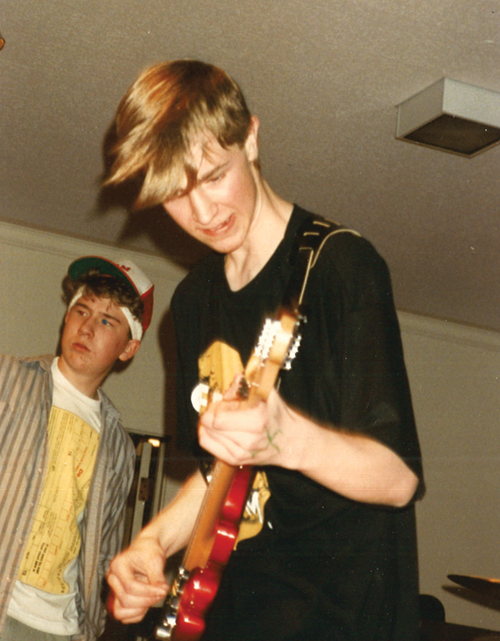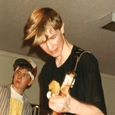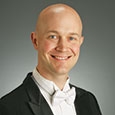
Matthew Temple in 1989 (above).
Once upon a time, I was in a high school rock band. We branded ourselves Laissez Faire, which was a French foreign economic policy that we learned about in World History. Literally translated it meant, “Hands Off,” which we of course thought was profoundly cool. We managed to record two albums of original songs and distributed them to our peers on cassette tapes. We mainly played in church basements, raising money for various mission trips and youth groups.
I can distinctly recall practicing for hours on end in my best friend’s basement. It was a fairly small, square room that was maybe fifteen by twenty feet. All of our amplifiers were fairly large, by comparison, and we generally practiced at deafening volumes. I often would lean over with my ear just a few inches from the cone of the bass speaker during practice sessions so that I could clearly hear myself above the raging guitars, drums, and vocals.
On occasion, I left practices with a ringing tone in my ears, or felt like my hearing was muffled. I would wake up the next day with my hearing presumably fully recovered. This was routine for me and my friends during our three year stint as a band. I had the same experience when I went to arena rock concerts. Like any high school student, I never thought about the potential ramifications for my hearing in the future.
In college, I rehearsed two hours a week indoors with a 300-piece marching band. The trumpet section alone numbered 64. Needless to say, the rehearsal hall was designed for a 100-piece symphonic band at most. The marching band barely squeezed into the room. It was commonplace for the drumline and piccolo section to wear protective earplugs, but the rest of the band didn’t give it any thought. I played in the marching band for just one year; I can only imagine what it must have been like for the director year in and year out.
Now that I have taught high school band for close to twenty years, I can see the blatant error of my ways back then. Unfortunately, hearing loss is permanent, and nobody was spreading the message when I needed to hear it. Thankfully, I have not lost as much hearing as one might presume. I had my hearing tested a year ago, and although there is no baseline according to age, my hearing loss to date has been mild. So now I have set about the task of not only protecting my own hearing, but making sure that my students understand the risks as well.
At New Trier, we recently partnered with a local audiology clinic to distribute free musician ear plugs to every member of the pep band. The clinic sent two audiologists to help fit the students and then gave a half-hour presentation on hearing loss. The students were genuinely interested in the information shared and were eager to make practical changes to their listening habits. For example, the audiologist explained that generally you should not listen to your mp3 player at higher than 60% of the total volume. If you do, you will be guaranteed permanent hearing damage over time.
They also gave us a dosimeter, a device that reads the level of sounds being produced and can alert you to dangerous volumes. I can use the dosimeter while rehearsing a concert band, jazz band, or pep band to determine the decibel levels of the group. There are applications readily available for smartphones that can accomplish the same thing.
If you don’t own a set already, I highly recommend purchasing a pair of musician’s earplugs. Traditional foam earplugs muffle noises unequally across the sound spectrum, making it impossible to lead a rehearsal. Earplugs designed for musicians cut noises evenly, allowing you to hear nearly everything you normally would but at a slightly softer volume. They are not necessarily ideal for the nuances of a wind ensemble rehearsal, but I feel they are great for pep band, marching band, and jazz band rehearsals when needed. Depending upon the situation, directors might even consider getting form-fitted personal earplugs. Though they cost considerably more, it is worth it to avoid hearing loss. Whatever you decide, be sure to use them consistently and explain to students why they are so important.
Directors should take care of their hearing away from school too. I use foam earplugs when using virtually any of the small engines that populate my garage. I also would not advise trying to drown out the noise of the lawn mower by using noise-canceling headphones to listen to music instead. Sometimes silence is golden.






